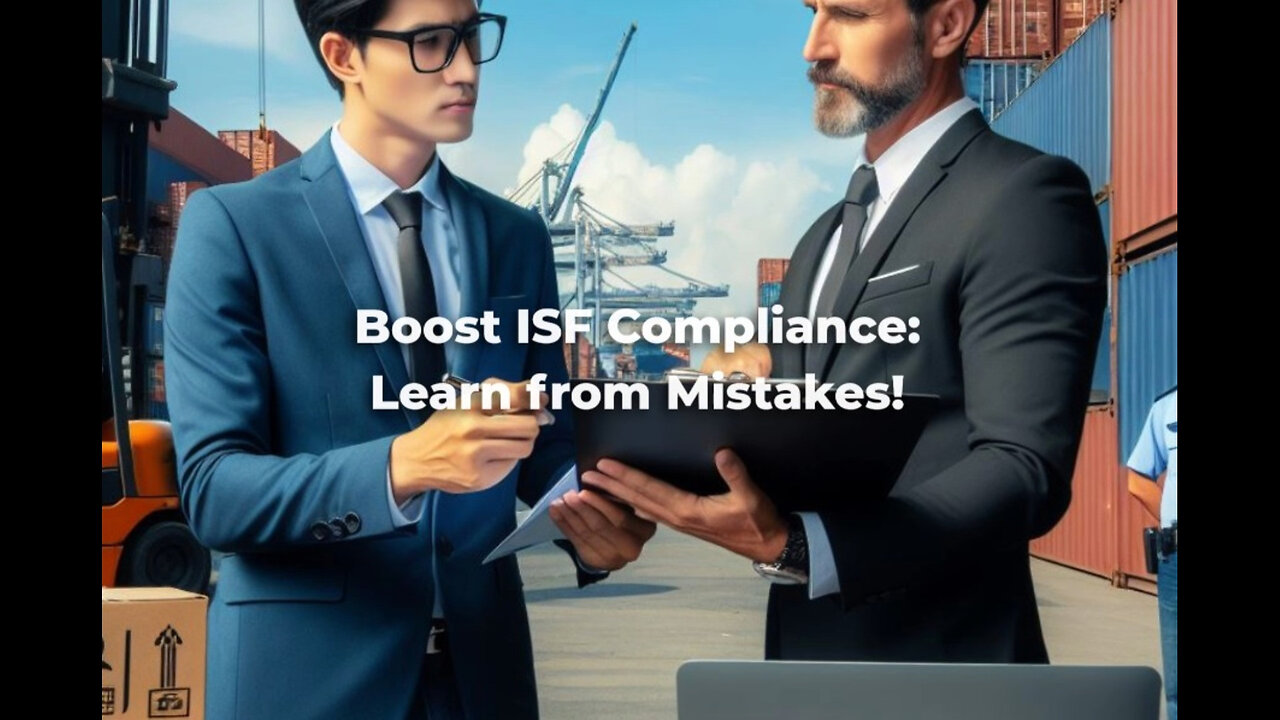Premium Only Content

Mastering ISF Compliance: 6 Strategies to Boost Your Import Success
ISF Checklist || 805-970-7918 || contact@isfchecklist.com || www.isfchecklist.com
Importers Security Filing (ISF) is an important process in international trade that requires importers to provide specific information about their cargo to Customs and Border Protection before it is loaded onto a vessel bound for the United States. Failing to comply with ISF requirements can result in hefty fines and penalties, making it essential for importers and customs brokers to learn from past mistakes and implement strategies to improve ISF compliance.
One strategy to improve ISF compliance is conducting a thorough internal audit of ISF processes. This audit should review documentation, filing procedures, and the accuracy of the information provided. Identifying gaps or errors in current procedures will help take corrective action and prevent future compliance issues.
Establishing clear communication channels between importers, customs brokers, and other relevant parties involved in the ISF process is crucial. Open lines of communication foster collaboration and ensure everyone understands their responsibilities and deadlines. Regular meetings and updates with stakeholders can address potential issues before they become compliance problems.
Utilizing advanced technology is another effective strategy to improve ISF compliance. Automating certain aspects of the process, such as data entry and document management, reduces the risk of errors and streamlines operations. Implementing a reliable software solution tailored to ISF compliance can greatly benefit importers and customs brokers.
Continual staff training and education are vital for maintaining ISF compliance. Investing in training programs that focus on the latest regulations and best practices keeps the team up-to-date with evolving requirements. This ensures accurate decision-making and minimizes the risk of non-compliance.
Establishing a strong relationship with a knowledgeable and experienced customs broker is another effective strategy. Customs brokers are experts in navigating customs regulations and can assist importers in meeting their ISF compliance obligations. Working with a trusted partner provides peace of mind and reduces the risk of compliance errors.
Regularly reviewing and analyzing ISF data provides valuable insights into areas that need improvement. By identifying patterns or trends in data, such as recurring errors or late filings, issues can be proactively addressed and corrective measures implemented.
In conclusion, learning from mistakes and implementing effective strategies is essential for improving ISF compliance. Conducting internal audits, establishing clear communication channels, utilizing technology, providing staff training, working with a customs broker, and analyzing data are all crucial components of a successful ISF compliance strategy.
#usimportbond
#isfcustomsbroker
#uscustomsclearing
#isfentry
Video Disclaimer Here: This video is purely educational and has no ties with the US government.
0:24 - Importance of ISF Compliance: ISF (Importers Security Filing) is crucial for international trade, requiring specific cargo information before loading for the US to maintain security and efficiency in supply chains.
0:40 - Learning from Mistakes: Failing ISF compliance leads to fines and penalties, so it's vital to analyze errors, gaps, and filing procedures to prevent future issues and take corrective actions.
1:00 - Effective Strategies: Clear communication among stakeholders, advanced technology for automation, continual staff training on regulations, and partnering with experienced customs brokers are key strategies to improve ISF compliance.
-
 LIVE
LIVE
TimcastIRL
2 hours agoDemocrats SHUT DOWN Congress Blocking Censure Of Al Green, OBSTRUCT House w/Joe Redden | Timcast IRL
19,235 watching -
 1:03:27
1:03:27
Glenn Greenwald
5 hours agoUK Pressures Apple to Break Encryption in Major Privacy Clash; How Dems Can Win Back the Working Class: With Former Bernie Sanders Campaign Manager Faiz Shakir | SYSTEM UPDATE #419
37.8K41 -
 47:39
47:39
Michael Franzese
4 hours agoJewelry King Trax NYC EXPOSES How the Powerful Steal from You
45.3K8 -
 LIVE
LIVE
Slightly Offensive
3 hours ago $2.86 earnedCandace REDPILLS the Masses in BOMBSHELL Theo Von Interview | Guest: Shane Cashman
1,119 watching -
 LIVE
LIVE
megimu32
3 hours agoON THE SUBJECT: IRL Streamers Attacked & Nostalgic Animal Movies That Made Us Cry
572 watching -
 1:00:54
1:00:54
The Tom Renz Show
7 hours agoMore Epstein/FBI, a Scary Trade War, & the Dem Echo Chamber
7.49K1 -
 40:43
40:43
Kimberly Guilfoyle
8 hours agoDems Double Down on Delusion-Why? Live with Tony Kinnett & Bo French | Ep.202
77.8K33 -
 1:28:42
1:28:42
Redacted News
6 hours agoBREAKING! SOMETHING BIG IS HAPPENING IN EUROPE ALL OUT WAR IS COMING AGAINST RUSSIA, TRUMP FURIOUS
121K282 -
 47:50
47:50
Candace Show Podcast
6 hours agoBREAKING: Judge Makes Statement Regarding Taylor Swift's Text Messages. | Candace Ep 155
113K112 -
 1:14:23
1:14:23
Josh Pate's College Football Show
3 hours ago $0.29 earnedCFB’s Most Hated Teams | FSU & Clemson Future | Big Ten Win Totals | Star Rankings Overrated?
14.5K